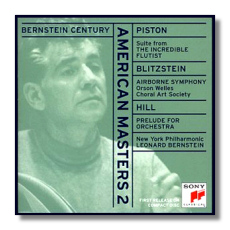
The Internet's Premier Classical Music Source
Related Links
- Latest Reviews
- More Reviews
-
By Composer
-
Collections
DVD & Blu-ray
Books
Concert Reviews
Articles/Interviews
Software
Audio
Search Amazon
Recommended Links
Site News
 CD Review
CD Review
Bernstein Century

American Masters 2
- Marc Blitzstein: Airborne Symphony
- Walter Piston: The Incredible Flutist *
- Edward Burlingame Hill: Prélude for Orchestra **
* Orson Welles, narrator
* Andrea Velis, tenor
* David Watson, baritone
* Choral Art Society
New York Philharmonic Orchestra/Leonard Bernstein
** Columbia Symphony Orchestra/Leonard Bernstein
Sony Classical SMK61849 ADD **Mono 78:09
Marc Blitzstein's Airborne Symphony is a fascinating bit of wartime Americana, and Bernstein, who was a "little brother" to the older composer, recorded it twice. RCA Victor reissued his first recording of it several years ago, and I am glad that Sony finally has reissued this one. While not necessarily better, it is in stereo, and it features the sonorous voice of Orson Welles.
Blitzstein wrote the work for the United States Air Force. (Sony's annotations claim it was an Army commission. Nevertheless, in 1943, when work on the Airborne Symphony began, Blitzstein was an officer in the Air Force, and was stationed in London.) The composer frequently had to take shelter against air raids as he wrote the symphony, which addresses both the positive and (most tellingly) negative aspects of mankind's ability to fly through the air. He suddenly was called back to America, and he mistakenly left the incomplete score behind. It was returned to him only after a long delay. In the meantime, Blitzstein (with Bernstein's encouragement) reconstructed the symphony from memory and hand-written notes. When the original score arrived, Blitzstein found himself to be more satisfied with the reconstructed version. He completed the symphony, and it was premièred in 1946, with Bernstein on the podium and Welles as the narrator (or "The Monitor"). By then, the war was over, but fear was not. The first recording, made later that year, substituted famed choral conductor Robert Shaw for Welles. Both have beautiful speaking voices, and both treat Blitzstein's text histrionically. If anything, Welles is more restrained in this 1966 recording, which also features excellent choral work. The important thing, though, is to give this work a try. Naïvely swaggering, thoughtful and populist, it has the power to be a crowd-pleaser. I wonder why there hasn't been more interest in it. Sony does not include texts (it did in the original LP release), but everyone's diction is clear enough to keep this from being problematic. How many classical works do you know that include the words "Snafu" and "Fubar"?
Bernstein studied harmony and counterpoint with Walter Piston at Harvard. The Incredible Flutist – the suite is recorded here – is a ballet score that premièred in 1938. The story that it tells is about an itinerant flutist, a sort of Pied Piper, whose playing charms both women and snakes. It's not an ambitious score and is less serious than Piston's symphonies and concertos. This recording was made in 1963. Bernstein conducts his teacher's work with an appreciation for its dry humor; he resists the temptation to exaggerate its effect.
Edward Burlingame Hill, born in 1872, was from an earlier generation than Piston. He taught the young Bernstein orchestration, also at Harvard. The Prélude for Orchestra was written when he was in his 80s. (He died in 1960, many years after Bernstein had become a star conductor/composer.) This 8-minute work is a fairly unusual example – particularly at this late date – of American impressionism. Bernstein said that Hill "was not a first rate genius, but a master of orchestration, a salty New Englander who loved Debussy," an opinion supported by this Prélude. Bernstein recorded it (in mono) in 1953 with the Columbia Symphony Orchestra.
This disc is another entry in Sony's "Bernstein Century" series. It seems that there is little that Bernstein recorded for Columbia and CBS (for any other label, for that matter) which is not on CD. That's something for them to be proud of.
Copyright © 2000, Raymond Tuttle


















